[ Tongam Rina ]
After years of demand by the Arunachal Pradesh Women’s Welfare Society (APWWS), the Arunachal Pradesh State Commission for Women (APSCW) was finally formed in 2005 by the Gegong Apang government.
The groundwork was started by Mukut Mithi’s government in early 2000, with the formation of a drafting committee comprising women’s rights activist Jarjum Ete, author-poet Mamang Dai, former MLA Yari Dulom, women’s rights activist Tadar Yadir, WCD Director Dishi Mihu Mallo, and Secretary to Government of Arunachal, Gonesh Koyu. The draft eventually took shape as a legislative bill which was passed in 2002.
Though a constitutional obligation, it took almost a decade of lobbying by the APWWS for the formation of the first commission in 2005.
The first commission had Jarjum Ete as its chairperson and Gumri Ringu, Jaya Joram, and Lomte Riba Ete as its members – a stellar group of women who spent their lives working for an inclusive, gender-just Arunachal under the aegis of the APWWS.
But over the years, the appointments to the APSCW, on which the government has the final say, were not without controversies. Many who had no background working for women’s rights were accommodated – clearly political appointees.
The Act itself states that those appointed should have sufficient experience of dealing with women’s rights issues.
Like in any other field, it helps to have some amount of experience and exposure in dealing with women’s issues, though one can always learn while in the job.
According to details obtained under the RTI Act, the fifth commission is not devoid of controversy because the laid down rules according to the Act were not followed.
Doctor, social activist and politician Nirmali Taba, known for her voluntary work with children with cleft lips and palates and young mothers in need of medical attention, was appointed the chairperson. Along with her, Padmeshwari Jamoh, a long-time social worker and one of the first BJP politicians in the state, and activist-lawyer Taba Rosy were appointed.
All three of them, given their background in their respective fields, deserve to be in the commission, but the hitch was that none of them applied for their positions, though one has to apply for the posts in order to be empanelled for final selection by the government.
Such open violation of rules not only sends out a wrong message but makes one wonder whether the government is actually serious about the Acts passed by the legislative assembly. What if someone else violates the government norms? Will the government have the moral standing to counter violation of laid down rules by others?
The WCD department seems to have messed up, but one cannot blame it since the final authority is the government – though one would expect the bureaucrats to stand up when Acts are openly violated.
One of the violations was in the appointment of non-APST member Padmeshwari Jamoh in the commission. The Act clearly states that only APSTs will be part of the commission.
Though many in the state are aggressively against the idea of making way for non-tribal members of the state in the workings of the state, it is about time those who have contributed to the state are acknowledged. The government has to take a call on this, though there is bound to be opposition. Inclusion is necessary for any society to learn and grow.
That apart, the 5th commission is yet to be filled up, with three more vacancies remaining, though more than 15 women applied for various positions.
With the additional burden of looking after the Arunachal State Commission for Protection of Children, without any resources, the government seriously needs to retrospect and fill up the vacant positions.
Till this year, the grant-in-aid to the commission was severely below the required amount. To top it, there are not enough employees in the commission and almost everyone is on a contractual job.
Chief Minister Pema Khandu and DCM-cum-Finance Minister Chowna Mein have taken a lot of pro-women decisions never seen before in the state. Right from inviting the APWWS, a pan-Arunachal tribal women organization, to be part of the budget process to allocating a fund of Rs 5 crore for construction of a destitute home-cum-working women’s hostel, the Pema Khandu government has taken steps forward to empower the women in the state.
The same government that enhanced the APSCW grant-in-aid to Rs 2 crore – though it is not enough if one looks at the kind of intervention it provides – needs to further figure out ways to strengthen the women’s and children’s commissions.
The onus is on the government. Perhaps the disappointment of the APWWS at the Pema government is compounded by the fact that it took some right decisions regarding women’s rights but procedurally lapsed while appointing the 5th Women’s Commission.
With women’s rights not acknowledged because everyone assumes women have equal rights in the state – which is absolutely not the case in reality – the government can do so much better, including respecting its own set laws to show the way forward.




